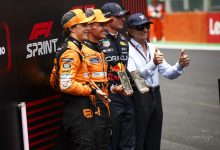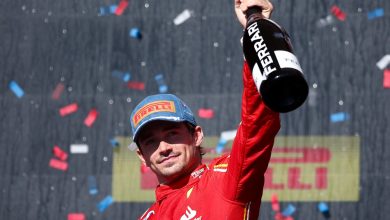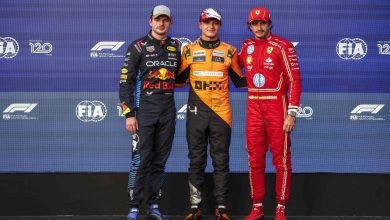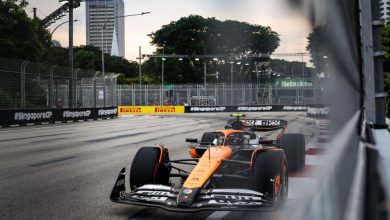Formula 1
Formula 1 is a really exciting place, feels Chloe Targett-Adams
Following the unveiling of Formula 1’s draft 2019 schedule, F1’s Director of Promoters and Business Relations, Chloe Targett- Adams, look back on the key deals that have kept classics on the calendar, looks ahead to F1’s 1000th grand prix and explains why she believes F1 “is a really exciting place right now”
Excerpts from an Interview:
Are you happy with the shape of the 2019 schedule and what F1 has achieved, especially with regards to recent developments that ensure continuity for some of F1’s classic races?
It’s always a really positive outcome when we renew long-standing promoter arrangements, such as with Belgium, and most recently with Japan and Germany. Having 21 races again is a big achievement for us and these races are important for all fans of Formula 1.
It’s always a challenge when you are looking at the calendar. There are so many different factors that come into play. We’re working with each promoter on what’s going on in their region, in their city and their major events calendar, whether there are logistical, weather challenges etc. There are always going to be some unfortunate clashes, but we do the best we can to create the most viable calendar possible, a schedule that we hope keeps fans happy from March right through to the beginning of December.
Last year the football World Cup complicated the scheduling of races, leading to the triple-header. Were there particular scheduling hurdles to overcome this time?
The triple-header was a unique situation and it’s not one we are looking to repeat, because obviously it imposes incredible challenges on personnel and teams.
When we look at scheduling our F1 calendar, we’re always aware that there are other sporting events happening – the Wimbledon men’s final around the time of Silverstone, NASCAR races around the time of the US Grand Prix and so on. There’s also the Rugby World Cup in Japan next year, at the same as the race in Suzuka, and there are other motorsport events across the year that we need to consider.
We also look at what’s going on in the region, in the city. There can be religious festivals we try to navigate around, such as the Qingming festival in China in early April. It’s complex, so we have to work out what is achievable to create the best outcome for Formula 1, the teams, our race promoters, our partners and our fans.
Are you pleased to be able to once again include the German Grand Prix on the schedule? Was it important to maintain its presence?
Very much so. An incredible amount of work went on behind the scenes to ensure that we achieved a positive outcome in Germany.
Following the previous German Grand Prix in 2016 there wasn’t much optimism about the future of the race, but this year’s event, which attracted a large and passionate crowd, proved that Germany still has an appetite for F1. Was that upswing a factor in getting a deal done?
I think when we last raced in Germany in 2016 it was a very different place. It is hard really to understand how different when you have a year without an event. In not having a German Grand Prix in 2017 it probably meant that excitement about the race was something that needed to be seen first-hand, understood, and believed once more. So I think this year’s race did have a positive impact and we are looking at recreating that in 2019 and onwards, hopefully.
Also, it is a big achievement to have Mercedes’ support in promoting and marketing the event within Germany. We’re extremely pleased that Mercedes has come on board. Hockenheim circuit was also incredibly proactive. I think they definitely saw a change in the F1 environment since their last race and that created a great platform on which to reach a good outcome to renew.
How important is it for F1 to retain what you might call ‘heartland’ events such as Germany?
It’s very important and if you look at what we’ve achieved this year in renewing with Belgium, Germany – not to mention Suzuka, which is a core part of the calendar and which celebrates its 30th grand prix this year – we are really determined to preserve the sport’s heritage as much as possible.
It’s not just those events, though; it’s about maintaining continuity across the schedule. We were successful in renewing with Singapore and China last year as well. Asia is a very important market for us. It just shows it’s a really positive future for our race promotion business going forward.
There are a couple of small changes from what might be called the ‘traditional schedule’, with Austin and Mexico swapping places and Singapore being back-to-back with Sochi. What were the reasons behind those moves?
Mexico’s event has normally fallen around the Day of the Dead festival, which is a huge celebration in Mexico and which the promoter builds into their event spectacle. It was important for them to maintain that connection and build up to that event with the Formula 1 race scheduled on the October 27th date. It was a collaborative process with each of our race promoters and again I think we arrived at the right solution given what’s happening in the region at the time.
With Russia, Singapore and Japan, ultimately it’s not easy to do any of those races back-to-back. It’s an incredible logistical feat. For the Sochi-Suzuka leg this year, we have six Jumbos going in and out and a very tight timeframe in Japan. So we were looking at how to make those races work in the most efficient manner for teams, mindful of all those factors. Talking with our internal teams and the race promoters, it seemed to come about that Singapore to Sochi and then rest for a week and before going to Japan, was the best outcome that we could reach with all those factors taken into consideration.
In terms of the timing, you are gaining time by going from Singapore to Sochi, so there is value in that and we also look to keep the continuity in broadcast times between Singapore and Sochi to engage with the widest audience, which is important.
Next year, of course, will see Formula 1 stage its 1000th grand prix, which is taking place in China. Do you have any plans in place for that event yet?
Firstly, I’d say let’s not forget that Australia and Bahrain come before China and each is as important as any other race. Each is a massive celebration, though of course we will also be building up to that 1000th grand prix. Reaching our 1000th race is an incredible achievement for Formula 1. There are some plans in place and a lot more being considered as we look for ways to really excite all the fans around such a milestone. I can’t give too much away now, but watch this space.
We’ve had a sequence of renewals, a solid draft calendar and plenty of enthusiasm about the future of races that might a few years ago have been the source of speculation. Can you point to a cause for that kind of optimism?
We are now proactive and working with our race promoters collaboratively to see how we can deliver that year round value they are looking for in partnering with Formula 1, meeting their objectives and also engaging as many fans in their race locations with the race and also our many new initiatives from F1 Experiences to E-sports.
Ultimately, I think Formula 1 is an incredibly exciting place right now. We’ve got a great calendar in place for 2019 and I am already working on 2020!







